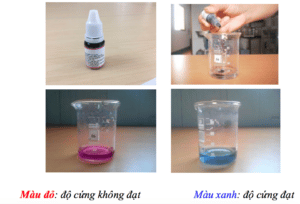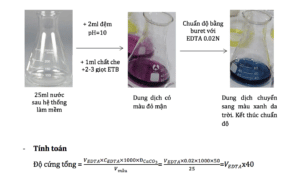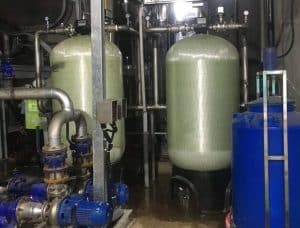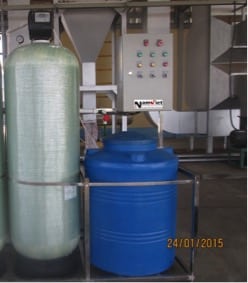What is water hardness?
- Hardness is the total content of calcium (Ca2+) and magnesium (Mg2+) ions in water.
Harmful effects of hardness in water.
- Detergent consumption
- Scaling clogs faucets and pipes
- Scaling in heat transfer equipment consumes fuel
- Poor heat transfer increases the risk of overheating and tube explosion, affecting production efficiency and safety
Water hardness standards
- According to QCVN 02-2009 of the Ministry of Health, the The total hardness in water is allowed up to 350mg/l, however, according to our assessment, this level is quite high, will cause many difficulties for daily life, and needs to be treated to reduce the hardness.</li >
- In production, depending on the industry, there are specific requirements for hardness in water supply.
- Usually soft water has a total hardness =<3mg/l
- However, some manufacturing industries have more stringent requirements and may require total hardness = 0mg/l
How to test hardness in water
Use Nam Viet’s quick hardness test
Step 1: Take 20 ml of water after the softening system.
Step 2: Add 2 drops of hardness reagent to the above water sample.

Step 3: Shake gently to dissolve the reagent in water
Step 4: Look at the color: If the water is red, the hardness is not satisfactory, if the water is blue, the hardness is satisfactory.
Note: When testing soft water, the color is RED is unsatisfactory for the boiler, urgent regeneration of the softening system is required
Testing hardness in water using titration method TCVN 6224:1996
Prepare chemicals
- 0.02N EDTA standard solution
Weigh 18.6g EDTA.2Na and dissolve it with distilled water, then make up the volume to 500ml at 60˚C. Leave the solution overnight, then dilute 10 times to get 0.02N EDTA solution.
- Buffer solution pH = 10
Dissolve 16.75g NH4Cl into 142.5ml concentrated NH4OH. Make up the volume with water to 500ml.
- Covering solution:
Weigh 5g of Na2S.9H2O and dissolve, dilute with distilled water to make 100ml. (immediately transfer to a glass bottle and close the lid).
- ETB Directive:
Weigh 0.5g ETB + 4.5g hydroxylamine (NH2OH.HCl) and completely dissolve in 100ml ethanol. (store in a dark glass bottle).
Experimental equipment:
Erlen 250ml, pipette 25ml, burette 25ml, burette holder, dropper.
Conduct the experiment:
Step 1: Use a 25ml pipette to take exactly 25ml of water after the softening system into the erlen.
Step 2: Add to Erlen 2ml pH=10 buffer solution, 1ml masking solution and 2-3 drops of ETB indicator. Shaken.
- If the solution in erlen appears green => hardness in sample <3mg/l => achieved, within control limits.
- If the solution in erlen appears red => detect hardness in the sample, proceed to the next step to accurately determine the hardness in the sample.
Step 3: Conduct hardness titration with 0.02N EDTA standard solution.
Place the burette containing 25ml of 0.02N EDTA standard solution on the burette stand. Place the erlen under the burette and perform the titration. Add 0.02N EDTA drop by drop to the erlen until the erlene changes from red to blue. At the end of the titration, record the amount of EDTA consumed (Vml).

The hardness in the water sample will be equal to the volume of EDTA consumed in the titration multiplied by 40.
In there:
Hardness unit: mgCaCO3/l
CEDTA: EDTA equivalent concentration = 0.02N
Vsample: initial sample volume = 25ml
Softening system Treats hardness in water by ion exchange method

Softener system installed by Nam Viet at Heineken Vung Tau brewery

The softening and hardness removal system for the boiler was installed by Nam Viet.
To treat hardness, there are many methods: using lime, heating, ion exchange… in which the ion exchange method is commonly used because it is effective and easy to operate.
Customers who want to learn more about the softening system to treat hardness, please refer to here.
Nam Viet, with 10 years of experience specializing in treating hardness, can reduce hardness to low levels or 0mg/l. If you need to install a softening system to treat hardness, please contact Hotline 0932562177for support and advice. question.


Bài viết liên quan
Drinking water treatment for pigs and issues to note
Drinking water for pigs in particular and water treatment in livestock farming in general is...
Pure RO bottled water filtration system
What is a bottled water filtration system? The bottled water filtration system is essentially an...
Commonly applied water disinfection methods
Water disinfection is a mandatory step in the drinking and drinking process. Natural water contains...